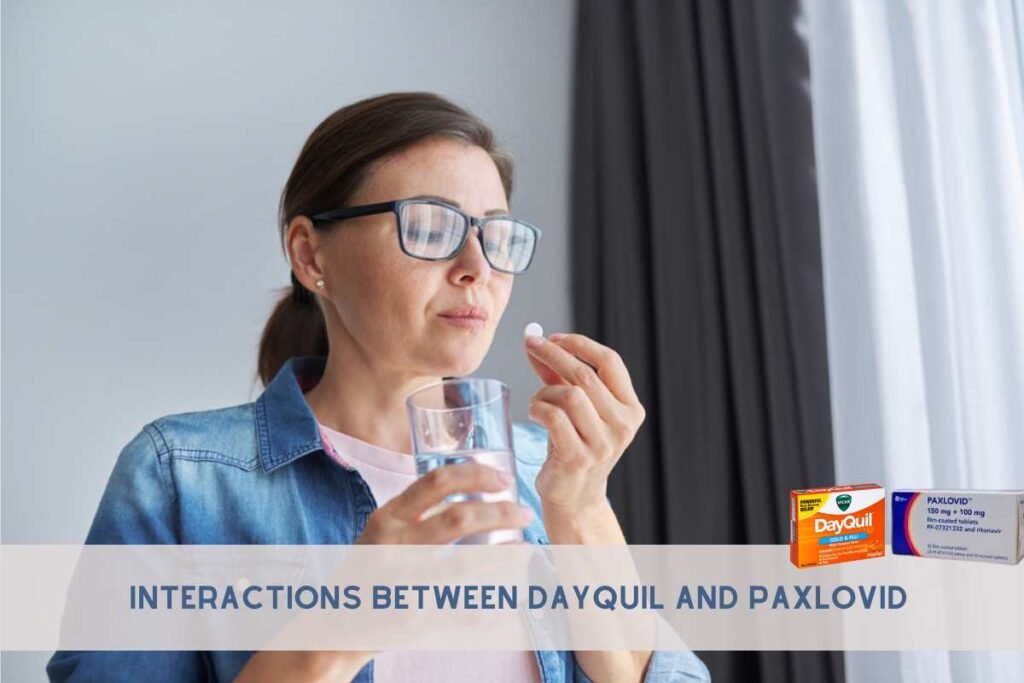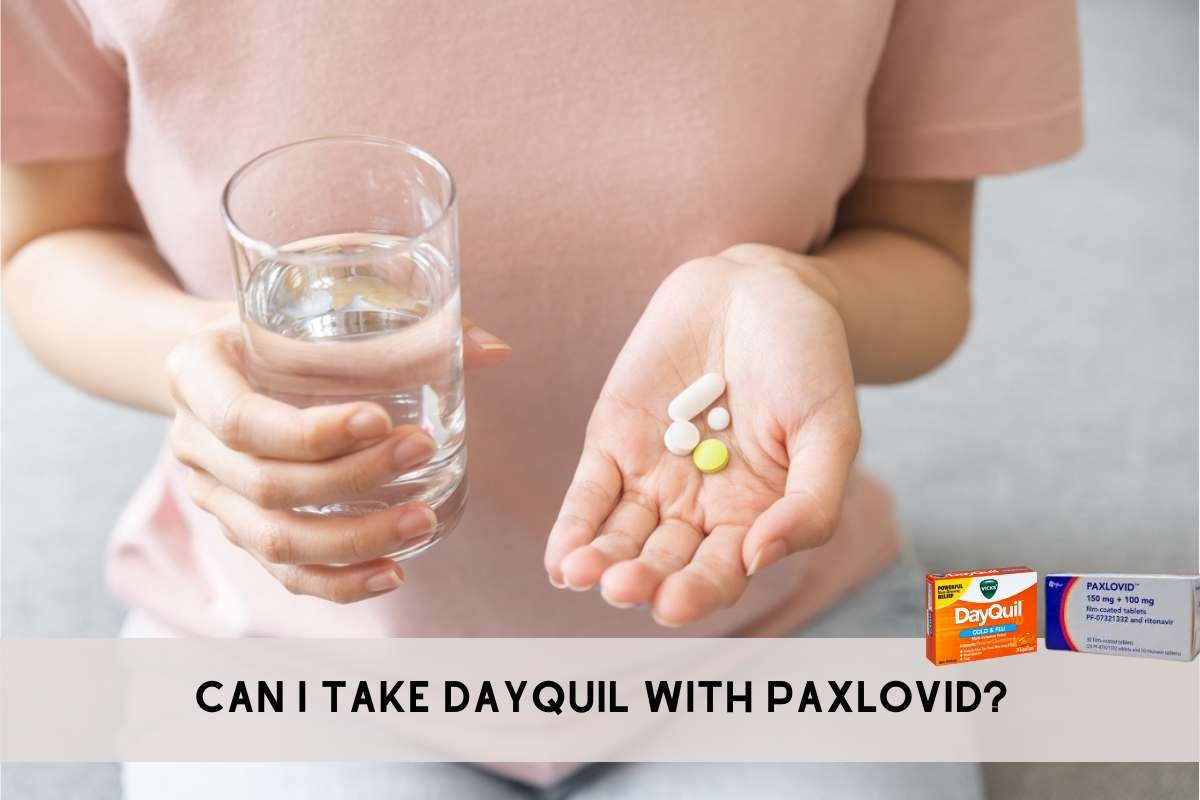Understanding how different medications interact can be challenging, especially when it comes to new drugs.
An example of such a situation that might be causing you some concern is the interaction between DayQuil, a common over-the-counter cold remedy, and Paxlovid, a new therapeutic option for COVID-19.
In this article, we will explore the specifics of DayQuil and Paxlovid, exploring their individual effects, the potential risks, and the safety of concurrent usage. We’ll also share advice from doctors to help you make correct choices about your health.
DayQuil and its Usage
DayQuil is an over-the-counter medication manufactured by Vicks which is widely used to alleviate symptoms of the common cold and flu.
It contains 3 active ingredients: acetaminophen, dextromethorphan, and phenylephrine.
Acetaminophen works to reduce fever and relieve pain, dextromethorphan serves as a cough suppressant, and phenylephrine is a decongestant that shrinks blood vessels in the nasal passages.
Thus, DayQuil is usually used to relieve:
- headaches,
- fever,
- minor aches and pains
- sinus pressure and congestion
- cough
- sore throat
- runny nose,
- and coughing.
Note that while DayQuil can help manage these symptoms, it does not cure the underlying illness causing them.
DayQuil Side Effects
Like most medications, DayQuil may also cause some side effects.
The common side effects include mild headache, mild dizziness, feeling nervous or restless, or sleep problems (insomnia). It’s important to contact your doctor if these side effects persist or get worse.
Serious side effects are less common, but if you experience severe dizziness, fast or irregular heartbeat, mental/mood changes (such as confusion, hallucinations), severe nausea, vomiting, or abdominal pain, seek medical help immediately.
Allergic reactions to DayQuil are uncommon, but if you experience any signs of a severe allergic reaction like rash, itching/swelling (especially on the face/tongue/throat), severe dizziness, or difficulty breathing, seek immediate medical help.
What is Paxlovid and its Usage?
Paxlovid is an antiviral medication developed by Pfizer for the treatment of mild-to-moderate COVID-19 in adults and pediatric patients (12 years of age and older and weighing at least 40 kg) who are at high risk for progressing to severe COVID-19.
It’s a combination of 2 drugs: nirmatrelvir, which inhibits the SARS-CoV-2 enzyme, preventing the virus from multiplying in the body, and ritonavir, which boosts the effectiveness of nirmatrelvir by slowing its breakdown.
Paxlovid is a medicine that you take by mouth. It is used when patients have tested positive for the virus and it’s been less than 5 days since they started having symptoms.
Clinical trials have shown that Paxlovid significantly reduces the risk of hospitalization or death from COVID-19.
Paxlovid Side Effects
Like any other medicine, Paxlovid can cause side effects that users should know about.
Common side effects include diarrhea, nausea, and taste disturbance. These may occur in the early stages of treatment but tend to decrease over time.
Less common but more serious side effects may include prolonged or painful erection, and signs of liver disease like nausea, continuously vomiting, dark urine, severe stomach/abdominal pain, or yellowing of the eyes/skin.
While allergic reactions to Paxlovid are rare, users should seek immediate medical attention if they notice symptoms such as rash, itching/swelling (especially on the face/tongue/throat), severe dizziness, or trouble breathing.
It is important to report any unusual or bothersome side effects to your provider immediately.
Can I take DayQuil with Paxlovid?
Yes, it’s generally safe to take both DayQuil and Paxlovid together. There are no known interactions between the two medications.
But everyone is different, and how things work can change depending on many factors like other medications you take, your overall health, and specific personal traits.
While no immediate interactions exist, both DayQuil and Paxlovid can cause similar side effects, like nausea, which might be enhanced when the drugs are taken together. So, it’s really important to pay close attention to how your body reacts and see a doctor if you notice any strange or serious symptoms.
It’s also worth noting that DayQuil can alleviate symptoms, but it does not treat COVID-19. In contrast, Paxlovid is designed to combat the SARS-CoV-2 virus directly.
Also Read: Robitussin vs Nyquil: Choosing the Best Cold Medicine
What are the Interactions Between DayQuil and Paxlovid?

As per the U.S. National Library of Medicine, there are no direct drug-drug interactions between DayQuil and Paxlovid.
However, it’s important to remember that both medications, when taken together, may intensify some side effects.
A common side effect like nausea could worsen. As a new medication, Paxlovid is still being closely monitored for possible interactions. If you experience any unusual side effects, remember to inform your provider.
Additionally, the effectiveness of Paxlovid can be affected by other factors, like how severe and long COVID-19 symptoms last, the overall health of the patient, and the presence of other underlying diseases.
On the other hand, DayQuil, which you can buy without a prescription, can help with common cold and flu symptoms, but it doesn’t have the ability to fight against COVID-19.
Why does Paxlovid have so many drug interactions?
Paxlovid has many drug interactions due to its mechanism of action and its metabolism. This drug is a combination of 2 active substances: nirmatrelvir, an antiviral drug that directly targets the coronavirus, and ritonavir, which is used to increase the level of nirmatrelvir in the body.
Ritonavir is known to inhibit a liver enzyme called CYP3A4. This enzyme is vital for metabolizing drugs, helping the body process and eliminate them.
By blocking this enzyme, ritonavir can raise the levels of other medications that are also processed by CYP3A4. This can result in a possible overdose and an increased chance of experiencing side effects.
CYP3A4 is an important enzyme that helps break down about 50% of all the drugs available. It’s crucial to consider this enzyme when thinking about possible interactions between different medications.
In addition, Paxlovid has not been extensively studied in certain populations, like pregnant women, children, and people with severe liver or kidney disease, so it should be used with caution in these groups.
Warnings or Precautions
Before taking DayQuil with Paxlovid, consider the following precautions and warnings:
- Always talk to your provider before starting any new medication, including over-the-counter drugs like DayQuil.
- Keep a close eye on your health for any new or worsening symptoms. Both DayQuil and Paxlovid may have side effects that could be stronger when taken together.
- While DayQuil is effective for relief from cold and flu symptoms, remember that it does not treat COVID-19. Paxlovid, on the other hand, is specifically designed to combat the SARS-CoV-2 virus.
- Remember, the effectiveness of Paxlovid can be influenced by factors like the severity and duration of COVID-19 symptoms, your overall health, and any other underlying conditions.
Conclusion
In conclusion, both DayQuil and Paxlovid serve different yet essential roles in managing the symptoms of illness. While DayQuil provides relief from common cold and flu symptoms, it does not have the capacity to treat COVID-19. In contrast, Paxlovid, a targeted antiviral medication, has proven effective in combating the SARS-CoV-2 virus directly. It’s important to talk to a doctor before starting or combining treatments to make sure they’re safe and right for your health needs.
FAQ
Can I take DayQuil if I am already taking other medications?
Yes, you can generally take DayQuil while on other medications. However, it’s vital to discuss all your current medications with your provider to avoid any potential drug interactions. Each person’s medical history and conditions are unique, so it’s always best to seek professional medical advice
Can I take Paxlovid if I have no symptoms of COVID-19?
No, because Paxlovid is only designed for those who have tested positive for COVID-19 and are exhibiting symptoms. It’s meant to stop the disease from getting worse in people who are at high risk for severe effects. If you don’t have symptoms, it’s best not to take Paxlovid without proper medical guidance.
Are there any alternative medications to DayQuil and Paxlovid?
Yes, there are numerous alternative medications to both DayQuil and Paxlovid. For relief from common cold and flu symptoms, alternatives to DayQuil might include medications like NyQuil or Tylenol Cold & Flu. As for Paxlovid, it belongs to a group of medications called antivirals. Other examples of antiviral drugs include Remdesivir and Molnupiravir.

Dr. Usman is a medical content reviewer with 12+ years of experience in healthcare research and patient education. He specializes in evidence-based health information, medications, and chronic health topics. His work is based on trusted medical sources and current clinical guidelines to ensure accuracy, transparency, and reliability. Content reviewed by Dr. Usman is for educational purposes and does not replace professional medical advice.
